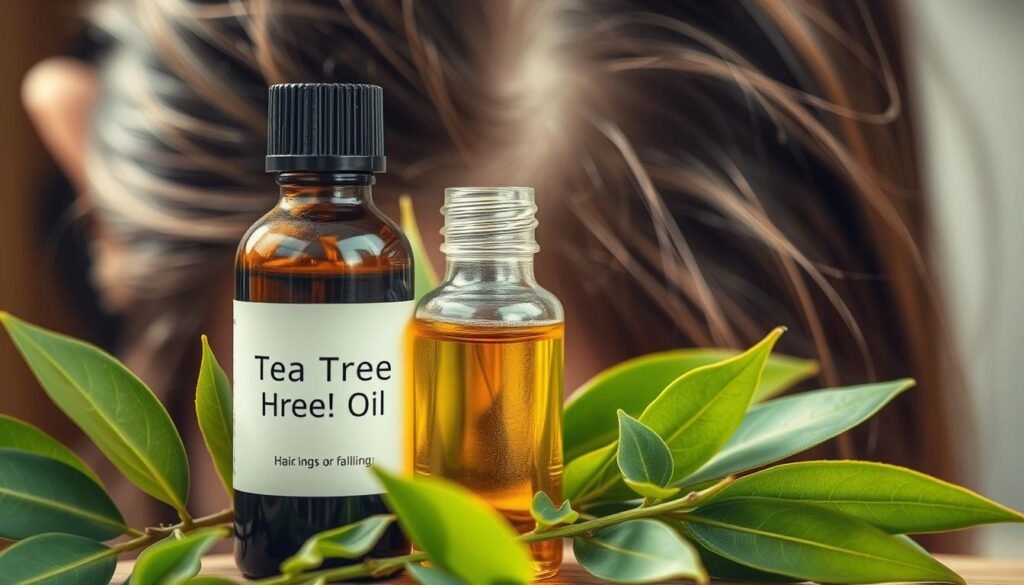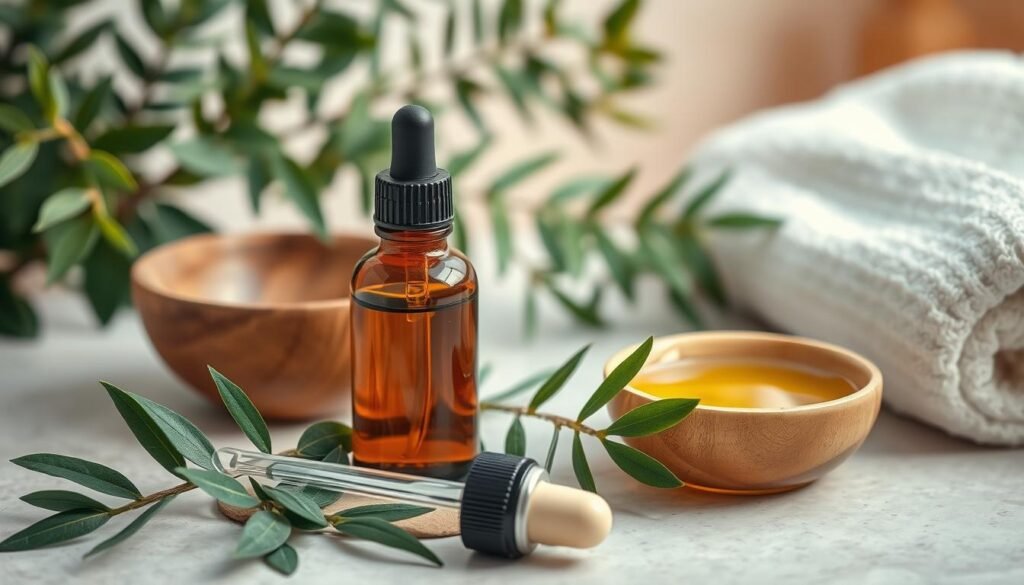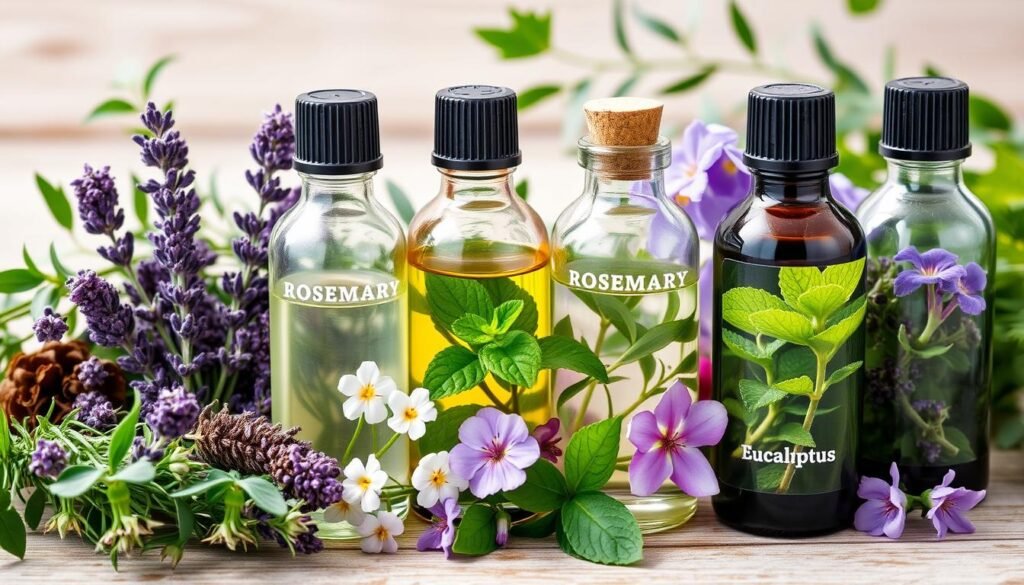About 41% of people saw less dandruff after using tea tree oil shampoo for four weeks. This shows its power as a natural remedy. But, does tea tree oil also lead to hair loss? Known for fighting germs, tea tree oil comes from the Australian tea tree. It’s popular in hair products due to its antifungal powers.
These can help with dandruff on the scalp. However, the effect of tea tree oil on hair health, including hair loss, is a hot topic. This article looks into if tea tree oil affects hair loss. It also covers how to use it right for the best effects.
Key Takeaways
- Tea tree oil is derived from the leaves of the Australian tea tree and is known for its natural germ-killing properties.
- Studies indicate tea tree oil can improve scalp conditions but lack definitive evidence for stimulating hair growth.
- It is essential to dilute tea tree oil before application to avoid skin irritation and allergic reactions.
- Researchers suggest using tea tree oil 2-3 times a week for optimal results while minimizing risk.
- Tea tree oil may help maintain a healthy scalp, potentially influencing hair growth consistency.
- Pregnant or breastfeeding women should consult healthcare professionals before using tea tree oil.
Introduction to Tea Tree Oil
Tea tree oil is made from the Melaleuca alternifolia leaves, native to Australia. It’s famous for its healing abilities. This oil fights bacteria, fungi, and inflammation, making it key in many personal care items. It’s especially good for tea tree oil for hair care.
The perks of tea tree oil benefits include solving hair and scalp problems, like dandruff. A study in 2021 showed that shampoos with 5% tea tree oil can help with dandruff. It makes the scalp healthier, which may help hair grow better.
It’s important to mix tea tree oil correctly with other oils. A good mix is 1 part tea tree oil to 10 parts carrier oil. Try using it once a week at first, then adjust as needed. Always do a patch test first, to avoid allergic reactions.
Tea tree oil has been used for many health issues over the years. It’s great in personal care. And its role in keeping hair healthy is still being found. Tea tree oil remains an important part of hair care.
Understanding Tea Tree Oil and Its Origin
Tea tree oil is famous for its many healing qualities. It comes from the Melaleuca alternifolia tree in Australia. The tea tree oil origin is key to its power. Australian natives have used this oil in their herbal remedies for a long time. The way it’s made captures its special qualities, including terpinen-4-ol, known for fighting germs well.
When you learn about tea tree oil properties, you see why it’s great for hair. It fights fungus well, especially Malassezia which causes dandruff. Using a 5% tea tree oil solution can reduce dandruff by 41%. This is according to the Journal of the American Academy of Dermatology.
Tea tree oil helps keep the scalp healthy. It controls oil and soothes itching. It also boosts blood flow when used in scalp massages, making hair healthier. It even opens up hair follicles for better hair growth.
If using tea tree oil, always dilute it first. Putting 2 or 3 drops in shampoo or conditioner is safer than using it directly. This way, you get its benefits without harming your scalp.
Want to know more about how tea tree oil helps hair? You can combine it with other oils for even better results. Find out more about tea tree oil’s potential in this detailed resource.
The Benefits of Tea Tree Oil for Hair
Tea tree oil is famous for its wide range of benefits for hair and scalp health. People love it because it brings visible results when used regularly. It’s a top choice for natural remedy enthusiasts.
Natural Antifungal Properties
Tea tree oil is known for its strong antifungal properties. It fights against Malassezia, a yeast that causes dandruff and flaking. Studies reveal a 41% improvement in dandruff after using tea tree oil products for four weeks.
This oil relieves itching and reduces flake buildup. It creates a healthier environment for the scalp.
Reduction of Dandruff and Scalp Conditions
Tea tree oil is great for dealing with an oily scalp. It balances oil production to prevent greasy hair. This leads to healthier looking hair.
It’s also soothing and helps reduce symptoms of scalp psoriasis and eczema. Overall, it enhances scalp health.
Moisturizing Effects on Hair and Scalp
Tea tree oil also moisturizes the hair and scalp. Its moisturizing products keep hair soft and manageable.
Regular use treats the scalp and unclogs hair follicles. This can promote healthier hair growth. Many users rate these benefits highly, giving them 4.4 out of 5 stars.
| Benefit | Description |
|---|---|
| Antifungal Action | Targets Malassezia fungus, reducing dandruff symptoms by 41% in studies. |
| Reduces Scalp Issues | Balances oil production and alleviates conditions like psoriasis and eczema. |
| Moisturizing Properties | Helps keep hair hydrated, soft, and manageable while promoting healthy growth. |
| Improved Hair Condition | Regular use leads to reduced itching and enhanced overall hair health. |
Can Tea Tree Oil Cause Hair Loss?
Tea tree oil is popular for its benefits, especially for the scalp. People often ask, can tea tree oil cause hair loss? The answer is not simple. Although tea tree oil is praised for its antifungal and antibacterial properties, results can vary from person to person.
Dandruff can lead to hair loss if the scalp is inflamed and scratched often. So, the impact of tea tree oil effects on hair loss is complex. The oil helps create a healthier scalp but isn’t a cure-all solution for everyone.
Studies show that tea tree oil can control excess oil on the scalp, which might boost hair health. Yet, direct proof that it stops hair loss is scarce. Some users could react badly to pure tea tree oil, causing skin problems and hair loss as a result.
It’s important to dilute tea tree oil with another oil before using it on your scalp. This can lessen the chance of adverse reactions. Applying it regularly improves blood flow, helping hair grow strong. Always do a patch test to avoid allergic responses, especially for those with allergies. Knowing how tea tree oil effects on hair loss work is key to using it safely.

| Aspect | Description | Impact on Hair |
|---|---|---|
| Antifungal Properties | Aids in maintaining a healthy scalp. | Prevents hair loss linked to scalp conditions. |
| Allergic Reactions | Possible irritation from undiluted oil. | May lead to hair loss if not addressed. |
| Excess Oil Regulation | Balances oil production on the scalp. | Improves overall hair health. |
| Patching Testing | Recommended for those with known sensitivities. | Helps prevent adverse reactions and protect hair. |
| Regular Application | Encouraged for optimal results. | Enhances blood flow and may support hair growth. |
Research and Evidence on Tea Tree Oil and Hair Health
People are looking more into natural remedies nowadays. This includes tea tree oil and its impact on hair health. Many studies have shown its benefits for things like dandruff and scalp health. Let’s explore the research and what science says about tea tree oil for hair care.
Studies Supporting Its Benefits
In 2021, a study found that shampoos with tea tree oil are good for dandruff. Australia has known about tea tree oil’s healing effects for nearly 100 years. The oil’s ability to fight microbes and fungus makes it excellent for scalp problems. Experts recommend using a shampoo with 5% tea tree oil once a week for best results. This method helps reduce itchiness and flakiness, improving hair health.
Scientific Insights Regarding Hair Loss
Looking into hair loss treatments is complex. A recent study showed combining tea tree oil with Minoxidil works better than just Minoxidil. This finding suggests tea tree oil has extra benefits in hair loss treatments. However, more research is needed, especially for conditions like central centrifugal cicatricial alopecia. The demand for effective hair care solutions is growing.
How to Use Tea Tree Oil Safely on Your Hair
Tea tree oil can improve hair health and scalp conditions safely. To get its full benefits without irritation, it’s crucial to use it right.
Proper Dilution Techniques
It’s important to dilute tea tree oil before using it. Applying it directly can irritate some people. Mix 15-20 drops of tea tree oil with two-thirds cup of a carrier oil, like almond or coconut. This helps prevent adverse reactions.
For adding to shampoo, mix in 2-3 drops per usual amount. This lowers the chance of irritation.
Application Methods for Maximum Benefit
To get the best results, match the application with your hair needs. Apply the oil directly to the scalp 2-3 times a week. Daily use of shampoos with tea tree oil is possible but be cautious of irritation.
Before full use, do a skin test on the inner arm. This checks for allergies over two to three days.

Using tea tree oil as part of your hair care can improve scalp health. Its antifungal, antibacterial, and anti-inflammatory properties can tackle scalp issues. Regular use might boost hair vitality and quality.
Tea Tree Oil Side Effects and Hair Loss
Tea tree oil is known for its benefits. But, it’s important to know about the possible side effects related to hair loss. Understanding the risks, especially allergic reactions and skin irritation, is key.
Possible Allergic Reactions
Allergic reactions can happen, especially if you have sensitive skin. You might see irritation, redness, or rashes. Try a patch test before using it all over. This helps spot any bad reactions. Components like 1,8-cineole may cause more allergies. If you react badly, stop using it right away.
Risks of Overuse and Irritation
Using too much tea tree oil isn’t good. It can irritate your skin, possibly making hair loss worse. Keep it below a 5% concentration to stay safe. When adding it to your hair care, mix it well. Never put it straight on your scalp.
With careful use, tea tree oil can be great for your hair. It helps by making your scalp healthier and managing oil. Learn how to use it safely to enjoy its benefits. For tips on using tea tree oil the right way, check out this useful guide.
| Symptoms of Allergic Reaction | Risk Factors |
|---|---|
| Skin irritation | Sensitive skin |
| Redness | High concentration usage |
| Rashes | Direct scalp application |
| Itching | Lack of patch test |
Comparing Tea Tree Oil with Other Essential Oils
Many people look into essential oils for hair growth to get healthier hair. Tea tree oil is well-known for its benefits. Yet, there are several other oils that also offer great hair care advantages. Getting to know these alternatives can improve hair care routines greatly.
Popular Alternatives for Hair Care
Tea tree oil alternatives are popular in hair care for their distinct features:
- Lavender Oil: Lavender oil, which is more hydrating, is praised for its calming effects. It also fights bacteria and fungus, making it great for the scalp.
- Peppermint Oil: This oil cools the scalp and boosts blood circulation, helping hair grow.
- Rosemary Oil: Rosemary oil, like tea tree oil, aids hair growth and has antioxidants for protection.
- Cedarwood Oil: It has shown promise in decreasing hair loss and encouraging growth, especially for people with alopecia areata.
Complementary Oils for Hair Growth
Using different oils together can make your hair healthier. Here are some mixes that go well with tea tree oil:
- Peppermint with tea tree oil: This combo can boost scalp circulation and fight conditions, aiding growth.
- Lavender and tea tree oil: These oils can soothe the scalp and help hair grow by being hydrating and anti-inflammatory.
- Rosemary oil with tea tree oil: Together, they can be a powerful duo for reducing hair loss and keeping hair healthy.
When looking into essential oils for hair growth, considering different oils can lead to better hair care. Each oil has its own strength to offer.
| Essential Oil | Properties | Benefits for Hair |
|---|---|---|
| Tea Tree Oil | Antiseptic, antifungal, anti-inflammatory | Helps reduce dandruff, unclogs hair follicles, and supports growth |
| Peppermint Oil | Cooling, circulation stimulant | Boosts blood flow and energizes the scalp |
| Lavender Oil | Hydrating, antibacterial | Calms the scalp, fights infections, and encourages hair growth |
| Rosemary Oil | Antioxidant, stimulant | Promotes hair growth and shields from damage |

Consulting with Healthcare Professionals
Hair loss can be hard to understand. If you see changes in your hair, it’s key to talk to healthcare experts. They can guide you with personalized advice based on your needs.
When to Seek Medical Advice
Knowing when to get help for hair loss is important. You should see a doctor if:
- Hair loss happens fast or without warning.
- You notice bald spots or thinning areas.
- Severe dandruff or itchiness with hair loss occurs.
- Hair loss comes after a big stress or event.
- You think you’re missing important nutrients.
Signs That May Indicate a Problem
Certain signs mean you might need expert help. It’s crucial to consult a doctor if you see:
- A lot of hair coming out when you wash or brush.
- Scalp irritation, redness, or swelling.
- Early hair loss in your family, especially before 30.
- Different hair texture, quality, or growth.
Taking the step to talk to a healthcare provider can lead to better results. Research shows that 60% of people are happy with their hair treatment after getting professional advice. For more on dealing with hair loss after chemotherapy, see this article on essential oils.
Conclusion
Tea tree oil offers lots of benefits for hair health, like fighting dandruff and keeping the scalp healthy. Studies in 2021 showed that shampoos with 5% tea tree oil really help reduce dandruff. This is great news since half of adults struggle with it. Yet, it’s important to use it safely to avoid any bad reactions.
Using tea tree oil the wrong way can cause irritation or even rare cases of hair loss. So, mixing 1 part tea tree oil with 10 parts carrier oil is key. People with allergies or sensitive skin must try a small amount first. Also, chatting with a doctor is wise, especially for those who are pregnant or breastfeeding.
Knowing the good and possible downsides of tea tree oil helps people make smart choices for their hair. By following these tips, you can enjoy its good effects and avoid any troubles. This way, the risk of hair loss from tea tree oil is less worrying, and its benefits can shine through.